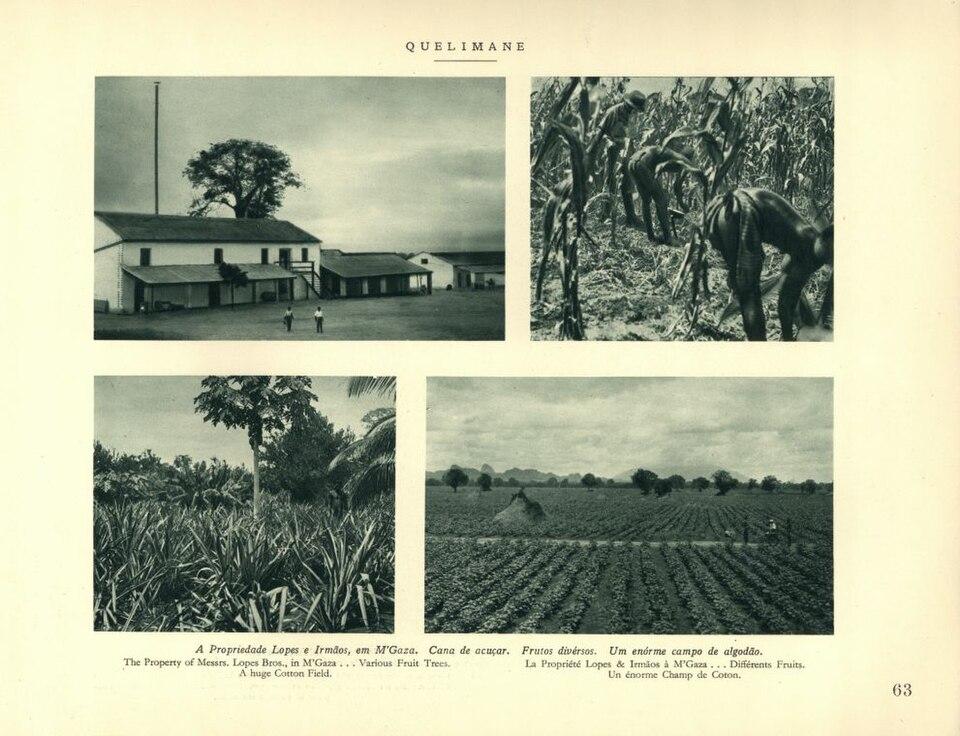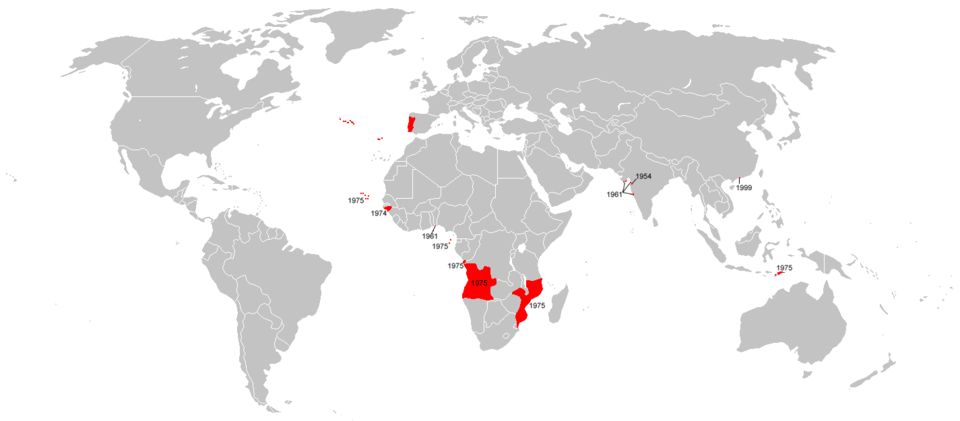IB Syllabus focus:
'Examine the economic, social, and political developments in Angola and Mozambique under Portuguese rule until 1975 and the implications of this colonial period.'
The Portuguese presence in Angola and Mozambique, established during the age of European colonialism, shaped the political, economic, and social landscapes of these regions in profound ways that reverberated through their histories until the mid-1970s.
Economic Developments
The Structure of Colonial Economy
Agriculture: Shift to monoculture; key products included Angola's coffee and cotton, Mozambique's sugar cane, tea, and cashew nuts.
Mining and Resource Extraction: Portugal exploited Angola for diamonds and oil, and Mozambique for its coal and precious stones.
The introduction of ‘Chibalo’ (forced labour system), which coerced local populations into working on European-owned enterprises.
The Impact on Local Economies
Cash Crops vs Food Production: Local needs were sidelined, causing periodic food shortages and reliance on imports.
Infrastructural Investments: Focused on supporting colonial exploitation; the construction of ports, railways, and roads for transporting goods, with little concern for local development needs.
Economic Policies and Reforms
The Cotton Regime in Mozambique (1938), a policy forcing African peasants to grow cotton for the colonial market, often at the expense of their own food crops.
Economic reliance led to market vulnerability, with African farmers suffering due to fluctuations in global prices for cash crops.
Social Developments
Education and Healthcare
Educational initiatives were primarily designed to train a subordinate workforce; higher education was virtually non-existent for the indigenous population.
Healthcare was tiered, with substantial facilities for the Europeans, while Africans had minimal access to medical services.
Impact on Societal Structures
The Portuguese propagated a civilising mission that intended to Europeanise African societies, often at the cost of local customs and structures.
Urbanisation led to the growth of cities such as Luanda and Maputo, creating new social dynamics and class distinctions within colonial society.
Demographic Changes and Labour
Massive internal migrations as African workers were recruited or forced into labour for plantations, mines, and infrastructure projects.
The colonatos system in Angola, a settler scheme aimed at populating rural areas with Portuguese, leading to land alienation and social displacement.
Political Developments
Colonial Administration
High Commissioner: The highest colonial authority, representing the Portuguese state, overseeing the centralised administration.
Imposition of Portuguese law, often disregarding local customs and governance systems.
Resistance and Nationalism
Formation of nationalist groups, like the MPLA (People's Movement for the Liberation of Angola), FNLA (National Front for the Liberation of Angola), and UNITA (National Union for the Total Independence of Angola) in Angola, and FRELIMO (Front for the Liberation of Mozambique) in Mozambique.
The Mueda massacre in Mozambique (1960), where Portuguese soldiers opened fire on protesting Makonde farmers, marked a significant escalation in the conflict.

The former administrative center at Mueda, Cabo Delgado—site of the 1960 massacre that galvanized anti-colonial resistance in northern Mozambique. The location became a touchstone in nationalist memory and FRELIMO narratives. Source
The Road to Independence
Armed struggle began in earnest in the 1960s, with guerrilla warfare tactics being employed against Portuguese forces.
The April 1974 Carnation Revolution in Portugal, which overthrew the Estado Novo dictatorship, precipitated the decolonisation process.

An overview map of the Portuguese Empire in the twentieth century, highlighting the global scope of Portuguese colonial rule—including Angola and Mozambique—on the eve of decolonization. Note that the map also shows non-African possessions, which exceed the syllabus focus but help explain the systemic nature of Portugal’s colonial retreat after 1974. Source
Implications of the Colonial Period
Economic Legacy
Post-independence, both nations inherited economies that were unbalanced, with a heavy reliance on the export of a small number of commodities.
Nationalisation of assets post-independence attempted to redistribute wealth but also led to economic disruption and decline.
Social and Cultural Impact
Emergence of mestiço communities, a social group of mixed African and Portuguese heritage, who played a unique role in post-independence society.
The social policies of the colonial period, such as the forced settlement schemes and labour regulations, created a legacy of disruption and dislocation that has persisted into the present.
Political and International Relations
Post-independence governance structures in both Angola and Mozambique were heavily influenced by the former liberation movements, with a tendency towards one-party states and socialist policies.
Cold War influences: Angola's civil war saw the intervention of both Soviet and US-backed forces, while Mozambique also experienced foreign intervention and internal strife.
Enduring Tensions and Conflicts
Civil Wars: Angola plunged into a protracted civil war lasting until 2002, while Mozambique experienced a devastating civil conflict from 1977 to 1992.
Both nations faced enormous challenges in reconciliation and nation-building, with the legacies of colonialism and conflict shaping their post-colonial trajectories.
The colonial experiences of Angola and Mozambique under Portuguese rule were characterised by economic exploitation, social engineering, and political oppression, leaving enduring legacies that have continued to shape these nations beyond their independence. Understanding these dynamics is crucial for grasping the complexities of post-colonial African states and their paths towards the future.
FAQ
The Portuguese Overseas Act of 1951 was pivotal as it rebranded Portugal's colonies as overseas provinces, supposedly integrating them into the nation as equal partners. This act aimed to consolidate Portuguese rule and resist the growing international pressure for decolonisation. In practice, the act did little to improve the status of the indigenous peoples in Angola and Mozambique. The supposed administrative integration did not translate into economic or social equality. Instead, it perpetuated the extraction of resources and ensured the continuation of the policies that favoured the white settler population and entrenched Portuguese economic interests.
The New State (Estado Novo), a corporatist regime established by Salazar in Portugal, significantly impacted the governance of Angola and Mozambique through its emphasis on authoritarian control and economic nationalism. The regime's policies were characterised by a strict security apparatus and an inflexible approach to colonial administration, focusing on the exploitation of the colonies' resources while suppressing any dissent or nationalism. The Estado Novo's influence reinforced the exploitation and coercion of the local population and ignored their political and social aspirations, leading to increased resistance and the eventual eruption of armed struggles for independence.
During the Cold War, Portugal's hold over Angola and Mozambique was influenced by the broader ideological battle between the United States and the Soviet Union. Western powers, particularly the US, initially supported Portugal as a bulwark against communism in Africa. However, as liberation movements gained traction and international opinion turned against colonialism, Portugal found itself increasingly isolated. Furthermore, the liberation movements in both colonies began to receive support from communist countries, such as the USSR and China, which saw these movements as part of a global struggle against Western imperialism, adding an international dimension to the independence struggles.
The 1974 Carnation Revolution had a profound effect on the colonies of Angola and Mozambique. The revolution led to a change in the Portuguese government and the subsequent dismantling of the Estado Novo regime, which had been steadfast in its policy of retaining the colonies. The new government, which included significant numbers of anti-colonial forces, was determined to decolonise rapidly. This shift in policy directly led to the Alvor Agreement in Angola and the Lusaka Accord in Mozambique, agreements that set the terms for the transfer of power and led to the independence of the colonies in 1975, albeit into situations of conflict and instability.
The Portuguese colonial policy of assimilation, or 'Assimilado', was designed to civilise and integrate select members of the indigenous populations into Portuguese culture. Indigenous individuals could achieve the status of 'Assimilado' if they adopted the Portuguese language, were Catholic, and abandoned their traditional customs. However, this policy was more than cultural imperialism; it was a means to create a small, privileged class within the colonised society that could serve as intermediaries between the colonisers and the masses. The implications were profound, creating deep social divisions and a loss of cultural identity, while reinforcing the overall structure of colonial dominance.
Practice Questions
The Portuguese economic policies had a deleterious impact on the indigenous populations of Angola and Mozambique. Forced labour systems, such as Chibalo in Mozambique, and cultivation schemes for cash crops significantly disrupted local subsistence economies, leading to food shortages and poverty. Indigenous people were coerced into low-paid work, often in harsh conditions, to fulfil the demands of the colonial economy. This economic model facilitated the extraction of resources and wealth for the benefit of the colonisers, while undermining the traditional agrarian societies and leaving a legacy of economic dependency and underdevelopment that outlasted colonial rule.
Portuguese colonial rule was instrumental in fostering nationalist movements in Angola and Mozambique. The oppressive policies, including forced labour, racial segregation, and the denial of civil liberties, cultivated a profound sense of injustice among the indigenous populations. This sense of injustice was exacerbated by the Portuguese refusal to grant meaningful political or social reform. Influential events, like the Mueda massacre, and the failure of the Portuguese to integrate the African populations into the colonial society, created fertile ground for nationalist ideologies. Consequently, the liberation movements, such as MPLA, FNLA, UNITA, and FRELIMO, gained momentum, drawing widespread support from the populace who longed for self-determination and independence.

